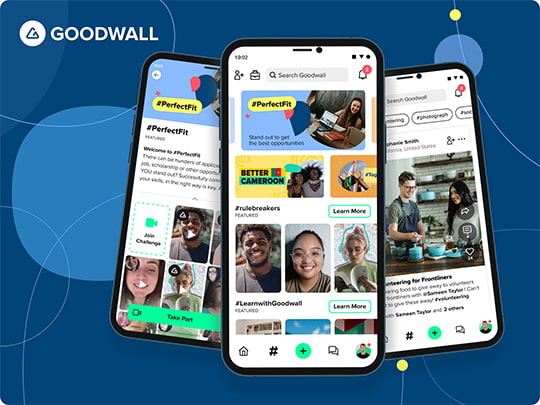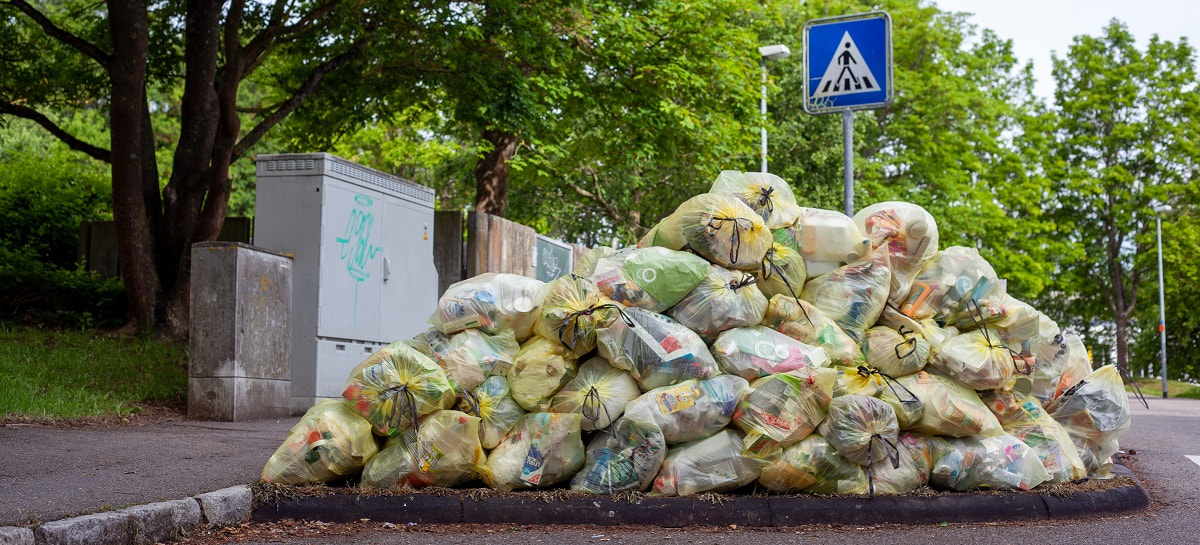Did you know that Americans waste 40 million tons of food each year, equivalent to almost 40% of the U.S. food supply? As a student or young adult, you know you should be playing a role in reducing food waste.
Reducing food waste is an important goal that can seem intimidating at first. After all, it can be challenging to break bad habits. But if you want to get the most out of the food you buy, you should learn how to reduce food waste.
Read on for ten simple tips that can help you save money and the planet by cutting back on the amount of food that ends up in the trash.

Want to Improve Yourself Each Day?
Sign up to Goodwall!
- Connect with improvement-focused people from 150+ countries
- Build valuable skills and experience
- Ask questions and get support when you need it
Download the app now to get started for FREE!
1. Plan Your Meals
One of the best ways to reduce food waste is by planning your weekly meals. The plan will guide you when shopping by ensuring you have an accurate idea of the food you intend to prepare.
Meal planning can help you avoid impulse purchases by only buying the ingredients you need for each meal. Planning will also help you reduce food waste at home by minimizing the number of ingredients you throw away.
When meal planning, it’d be best to think like a chef. Use meal-planning templates to help you create a grocery list based on the dishes you want to cook. Many grocery stores also offer meal planning services to their customers, which can be another useful resource for reducing food waste.
2. Be a Smart Food Shopper
When it’s time to buy the ingredients you need for your meal plan, make smart buying decisions. The goal is to avoid buying more food than necessary.
A good practice is to avoid buying in bulk. Even if you think that buying your veggies in bulk is convenient, there’s a high chance that they’ll end up in your trash bin. And you’ll have failed in reducing your carbon footprint.
You should also consider frequenting the grocery store after a few days instead of only shopping on weekends. Ensure that you deplete your old food stock before making another trip to the grocery store.
Make a food shopping list and stick to it. This will help you avoid buying items that you don’t need.
Related Read: Point Source Pollution & Nonpoint Source Pollution (Definition, Examples)
3. Be Mindful of Food Expiration Dates
One of the main reasons people throw away food is that they ignore expiration dates, or don’t understand the date labels. It’s essential to be mindful of the dates on your food packaging. Packaged foods produced at a commercial level are often stamped with expiration dates, even if they still have a long shelf life.
Ensure you understand the terms “best by” and “sell by.” The former is the suggested date by which you should use the product. The latter indicates when the store should remove the product from the store shelves.
These terms do not mean you’ll get sick after using the product past the indicated date. They only mean that the food may not be at its tip-top quality after the shown date. You can still eat them past their expiration dates as long as they’ve been stored properly.
Oh, and if you’re looking for a way to save money in college, you can buy perfectly good food at the supermarket nearing the dates on their food labels. You’ll be getting discounted prices, cutting food waste, and helping reduce greenhouse gas emissions, all at the same time!
4. Store Your Food Properly
To reduce food waste, you should also know how to store your food properly. This will help prolong their shelf life and prevent spoilage, which may keep you on track toward your goal to avoid wasting food.
When storing food, keep in mind that the temperature at which you store your food can affect its quality over time. Store perishable foods like meat and dairy in the refrigerator. Store fruits and veggies on a cool, dark shelf to prevent them from rotting too quickly.
Store them in the freezer if you have any leftovers that you’re not planning on eating immediately. When storing dry goods like grains and beans, use airtight containers and store them in a cool, dry place. This will prevent moisture and pests from getting to them.
Related Read: How Does Pollution Affect the Environment? Air, Water, Waste & More
5. Use Simple Food Preservation Techniques
Besides proper storage, there are other simple food preservation techniques that you can use to reduce your food waste.
The best thing about these old-school methods is that they are beginner-friendly and fun. When done correctly, these methods can help your food last for days.
One way is to pickle your vegetables by soaking them in vinegar or brine (saltwater). This will help them last for several months without going bad. You can also preserve fruits by making jams and jellies.
Dehydrating is a great way to prolong the shelf life of perishable foods like fruits and vegetables. You can either use a dehydrator machine or an oven.
You can also freeze your herbs to make them last longer. Simply chop them up and store them in an ice cube tray with some water or olive oil. (Learn some great tips for how to save water.)
6. Mind Your Serving Sizes
This is one of the simplest and most practical tips to reduce food loss, though it’s often quite difficult in practice. You can reduce food wastage by serving only the portions you can finish. When eating out, order only what you can finish.
If you’re cooking for your friends, ask everyone to take only the portions they can eat. You can also reduce portion sizes by using smaller plates. Studies have shown that people tend to eat less when they use smaller plates.
When eating out with your peers, you can share a meal. Sharing is especially vital if you’re in a restaurant that serves huge portions. Plus, it will be a perfect way to have great conversations about school, work, or personal life.
Related Read: 65+ Best Earth Day Quotes About the Climate, Environment, and Nature
7. Put Perfectionism Aside
Are you the person who rummages through a basket of fruit and vegetables until you find the most pleasing bunch? Then you’re contributing to food waste! You don’t want rotten produce, of course, but misshapen fruits or vegetables with physical imperfections are just as great as their prettier counterparts.
When shopping for fruits and veggies, try to be a bit more forgiving. Perfectly shaped produce doesn’t necessarily mean that it’s fresh or tasty. In fact, some of the best varieties contain blemishes.
Resist the temptation to only buy perfect-looking produce when grocery shopping. Instead, be more open to trying even ugly vegetables and fruits.
They may not be pleasing to your eyes. But you may be surprised at how good they can taste, despite their appearance.
8. Don’t Throw Out Food Scraps
You probably remove food scraps from veggies and fruits before eating or preparing them. You may also be fond of skinning your chicken before cooking it. It’s sad that you lose one of the most nutritious components in your food items.
If you want a great idea for how to reduce food waste, don’t throw out food scraps, especially if it’s perfectly edible food. There are actually a lot of ways to make use of them. For example, you can use vegetable scraps to make homemade vegetable broth, or make a great chicken broth or soup by using the remaining parts of a chicken carcass. You can also use fruit peels and cores to make homemade jams and jellies.
You can use the bones from cooked chicken or turkey to make homemade soup stock. And you can use bread crusts to make croutons or breadcrumbs.
So if you’re serious about reducing food waste at home, think twice before you throw out food scraps. There may be a way to use them that you haven’t thought of yet.
Related Read: 25 Small Acts You Can Do to Have a Great Impact
9. Declutter Your Fridge
A cluttered fridge is a common contributor to food waste. It’s easy to lose track of the food you need to eat or the leftovers you need to freeze. With proper organization, you will be able to use leftover ingredients more efficiently.
To minimize food waste, declutter your fridge regularly. Get rid of expired items, and label the ones you want to keep track of. Put the older items in the front so you can see and use them first.
Use a whiteboard or chalkboard to write down a list of groceries that you need to buy. This will help you keep track of what you have and what you need, so you don’t end up buying things that are still in stock.
10. Don’t Throw Away Leftovers
One of the main contributors to food wastage is that people throw away leftovers. People either forget about them or don’t know how to properly store them.
Leftovers can actually be a great way to save money and reduce food waste. When eating out, ask the waiter to package your leftovers and bring them home. You can store them in the fridge for up to four days, or in the freezer for up to six months.
To avoid forgetting about the leftovers, store them in your fridge using a clear container. Also, designate a day when you’ll eat what’s left in the fridge. They’ll come in handy when your capstone project has left you with no energy to cook.
When storing leftovers, be sure to label them with the date so you know when you need to eat them. And when reheating them, be sure to heat them until they’re steaming hot. This will help kill any bacteria that may have grown while the food was stored.
Related Read: How Does Recycling Help the Environment? (& 10+ Materials to Recycle)
Learn How to Reduce Food Waste
Are you tired of seeing the food that cost you a fortune go to waste? If so, then it’s time to learn how to reduce food waste. Start by following the simple tips above, and you’ll be surprised at how much money you can save in the long run.
If you’re interested in working with other young people to advocate for reduced food waste, you can join Goodwall. Our platform will connect you to other youths with whom you can partner to address the world’s biggest issues.




It is easy to save a ton of money on food. Firstly check your supplies each week, perhaps make out two color coded lists one of what you have and one for what you lack. Be very creative at home when making food in order to eat as well, there are tons of ways to re use leftovers that do not cost anything really.
Make full use of free culinary resources mainly cookbooks. You can find some to borrow at your local library so start there. Good luck. Or maybe look at recipes online, bbcgoodfood is a nice website to use for inspiration and ideas too. You can keep a folder of fun appealing recipes in addition in any case to refer to from time to time.
Have fun.